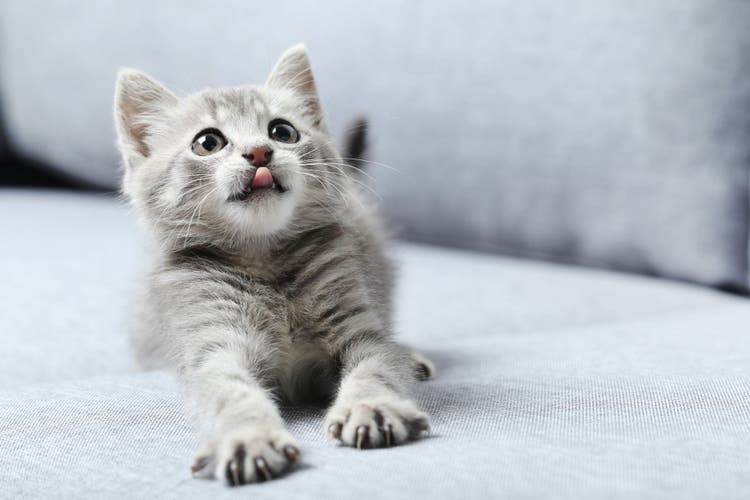
Bonding in Cats
When a kitten is born, it knows nothing of the world around it. However, it does know enough to stay close to its mom and the milk bar. The only important task for the kitten during the neonatal period is to (subconsciously) maintain a degree of physiological balance. Nursing and sleeping are about all a kitten is capable of at this stage.
After a week or ten days of hanging around mom, the kitten’s eyes and ear canals open and it begins to process information about the surrounding world. Reflexes and mother’s care have brought the kitten thus far but increasingly, know-how, including the establishment of proper relationships with others, becomes necessary for its continued success in life. The first and most important relationship a kitten forms is with its mom.
If a kitten is separated from its mom, she will retrieve it. If it cries, she will attend to it. If it is hungry she will feed it. The kitten’s trust and reliance develop quickly as mom invariably finds a way of providing for the youngster’s every need.
This mutual interaction brings satisfaction and relaxation to both the mother cat and kitten. A strong bond develops and the kitten no doubt feels at one with its epimeletic parent. For kittens, mistrust of unfamiliar individuals begins to develop around 5 – 7 weeks of life. This is a necessary development to protect the youngster from those that would do it harm.
The original bond a kitten has with its mom is the most important one it will have. If, when the kitten cries, its mom routinely responds, it will develop confidence. If she grooms it regularly, its nervous system will literally sprout. If she’s always right there when the kitten turns around for assurance, it develops confidence. Well-tended kittens have higher self-esteem, are smarter, and seem to regulate their emotions better. A “functional” kitten – one that can make its own way in the world – is the result.
Over time, kittens’ relationship with their mom progresses from one of simple devotion and dependence to a more voluntary affair. Their association with mom becomes more of a friendship between individuals who enjoy each other’s company. Somewhere along the road of development, usually between 3 and 6 weeks of age, kittens learn social etiquette from playful interactions with their siblings.
But an interpersonal cataclysm lies in waiting for most young kittens. At the relatively tender age of 8 weeks, most kittens are adopted by well-meaning humans who try their best to make the kitten’s transition from it mom and littermates as painless as possible. But strangers are no substitute for the kitten’s own family. Some early separation distress is almost inevitable and will be witnessed by the kitten’s new family as crying, especially at night. Ill-informed friends may advise, “Let the kitten cry. She’s got to learn. You don’t want to make a rod for your back, do you?” Nothing could be further from the truth.
At this stage, you (the parent stand-in) must tend to the kitten’s demands, just its mom might have. This way, you keep the kitten on the right track regarding its intellectual and social development. One of the great spins-offs of providing such care is that the kitten will re-attach to you, the new provider, and will turn out every bit as confident and self-sufficient as its real mom would have liked.
Imprinting, an elemental form of bonding, occurs most readily during a sensitive period of development. If the time and circumstances of an initial introduction of animals is appropriately staged, it is quite literally possible to have a lion lie down with a lamb. With this in mind, it’s almost child’s play to have a cat bond with a cat – subsequently learning to be accepting of cats in general. All you have to do is arrange for benign introductions to occur during the sensitive period of development. The sensitive period for such learning to occur in cats is between 2 – 7 weeks of age. During this time period, owners can engineer all kinds of useful friendships between animals of the same or different species.
As many owners already know, cats don’t just bond to their moms or to their human owners. They may also bond to other cats. So powerful can such bonds be between individuals that they may show separation anxiety if separated. This is not a bad arrangement until longterm separation through illness or death becomes inevitable. In such cases, cats must be trained to develop new bonds with either other cats (a new kitten, perhaps) or new human acquaintances. In severe cases, antidepressants may be needed to help such formerly bonded cats around this sharp corner of life.
If all has not gone according to plan for a kitten, by way of bonding experiences in early life, all is not lost. Many dysfunctional cats who start out overly dependent on their human caregivers can be retrained to develop confidence in themselves, they can be trained to be independent i.e. to stand on their own four feet. It’s damage control for sure, but it works. Whatever they say, you can teach and old cat new tricks, though it may take a bit longer.